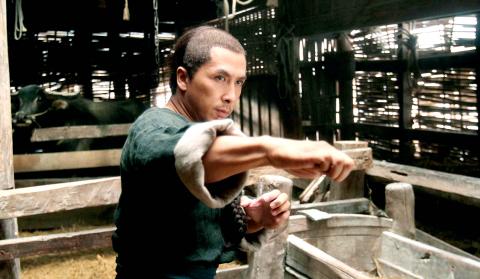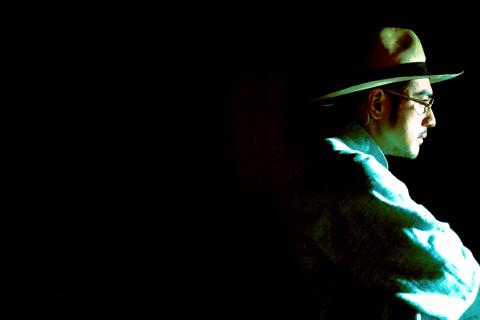Masterfully executed, action-packed and with the winning pairing of Donnie Yen (甄子丹) and Takeshi Kaneshiro (金城武), Peter Chan Ho-sun’s (陳可辛) Wu Xia (武俠) promises exhilarating entertainment as a summer blockbuster. But this is not your usual kung fu flick full of fancy wirework or Chinese martial artists drubbing foreigners.
Chan gives the overworked genre a contemporary feel by wedding it with a detective story, continuing his study on the human condition, and in this case, on the theme of revenge and redemption.
Yen plays Liu Jinxi, a papermaker who lives a peaceful life with his wife, Ayu (Tang Wei, 湯唯), and their two boys in an idyllic village in China’s Yunnan Province. The tranquility is disrupted, however, when Liu accidentally dispatches two vicious thugs who try to rob a general store.

Photo Courtesy of Applause Entertainment
The seemingly gentle papermaker claims he only got lucky, but detective Xu Baijiu (Kaneshiro) is not convinced. After a series of investigations that involve using his forensics skills and expertise on martial arts to reconstruct the deadly fight, Xu comes to believe that Liu is a professional killer and a runaway member of the 72 Demons, a dwindling clan of Tanguts that was persecuted by the Han Chinese and became murderous and vengeful under the leadership of its fierce chief, played by kung fu legend Jimmy Wang Yu (王羽).
It does not take long before Xu’s persistent pursuit unintentionally exposes Liu’s whereabouts to his clansmen. As a result, the renegade murderer is forced to come face-to-face with his shadowy past, which threatens to shatter his second life as a reformed man.
Paying homage to Chang Cheh’s (張徹) classic One Armed Swordsman (獨臂刀) series that propelled Wang to superstardom in the 1960s, Chan’s martial arts flick recalls the sinewy, visceral and boldly violent works exemplary of the golden age of Hong Kong kung fu cinema. To the credit of action star and choreographer Yen, the film’s three climactic fight sequences forsake visual stunts for close-range combat executed in a graphic, ferocious style. The cinematic tradition is further reinforced by the appearances of veteran Kara Hui (惠英紅) and the legendary Wang, who possess both martial arts prowess and commanding on-screen presence.

Photo Courtesy of Applause Entertainment
Thankfully, director Chan does not stop here. He tries to modernize the genre and succeeds. The film will appeal to a contemporary and international audience as it unfolds like a thriller in which Kaneshiro’s erudite character resorts to science when peeling away the layers of mystery surrounding Liu and his kung fu. In Aubrey Lam’s (林愛華) amusingly imaginative script, Chinese martial arts skills are just that — skills, not some magical power. They are the result of physics, physiology and Eastern medicine and thus can be clearly illustrated through the film’s abundant computer-generated charts of human anatomy explaining things like how and why a single blow to a pressure point can kill a man.
As in Chan’s past genre hits such as The Warlords (投名狀), humanity and emotion are never sacrificed for style and form. Wu Xia examines the moral struggles of a killer and a detective who are oftentimes isolated in darkness or framed against the lush Yunnan countryside by the color-saturated cinematography of Jake Pollock and Lai Yiu-fai (黎耀輝).
The characters’ scarred pasts, secrets and fears are revealed, which in turn shape their views, behaviors and beliefs. For example, the film’s opening scene not only affectingly portrays the everyday life of a simple family, but effectively reveals that happiness is cherished and deemed transient by the husband and wife, who separately carry their own burdens from the past.
The most complicated and intriguing character is Xu, for whom emotions can be controlled by acupuncture needles, and human compassion and repentance should never eclipse the law. Like Liu, the detective and off-screen narrator has to battle inner demons as the investigation gradually becomes his personal quest for redemption.
Yen once again proves that an action hero can also pluck heartstrings. But the star of the film is Kaneshiro, who shines with his comic, slightly absurd rendition of the eccentric detective. And though women rarely take central stage in the male-dominated genre, Tang is worth a mention for her convincing portrait of a simple countrywoman whose life revolves around her man and children.

June 9 to June 15 A photo of two men riding trendy high-wheel Penny-Farthing bicycles past a Qing Dynasty gate aptly captures the essence of Taipei in 1897 — a newly colonized city on the cusp of great change. The Japanese began making significant modifications to the cityscape in 1899, tearing down Qing-era structures, widening boulevards and installing Western-style infrastructure and buildings. The photographer, Minosuke Imamura, only spent a year in Taiwan as a cartographer for the governor-general’s office, but he left behind a treasure trove of 130 images showing life at the onset of Japanese rule, spanning July 1897 to

One of the most important gripes that Taiwanese have about the Democratic Progressive Party (DPP) is that it has failed to deliver concretely on higher wages, housing prices and other bread-and-butter issues. The parallel complaint is that the DPP cares only about glamor issues, such as removing markers of Chinese Nationalist Party (KMT) colonialism by renaming them, or what the KMT codes as “de-Sinification.” Once again, as a critical election looms, the DPP is presenting evidence for that charge. The KMT was quick to jump on the recent proposal of the Ministry of the Interior (MOI) to rename roads that symbolize

On the evening of June 1, Control Yuan Secretary-General Lee Chun-yi (李俊俋) apologized and resigned in disgrace. His crime was instructing his driver to use a Control Yuan vehicle to transport his dog to a pet grooming salon. The Control Yuan is the government branch that investigates, audits and impeaches government officials for, among other things, misuse of government funds, so his misuse of a government vehicle was highly inappropriate. If this story were told to anyone living in the golden era of swaggering gangsters, flashy nouveau riche businessmen, and corrupt “black gold” politics of the 1980s and 1990s, they would have laughed.

It was just before 6am on a sunny November morning and I could hardly contain my excitement as I arrived at the wharf where I would catch the boat to one of Penghu’s most difficult-to-access islands, a trip that had been on my list for nearly a decade. Little did I know, my dream would soon be crushed. Unsure about which boat was heading to Huayu (花嶼), I found someone who appeared to be a local and asked if this was the right place to wait. “Oh, the boat to Huayu’s been canceled today,” she told me. I couldn’t believe my ears. Surely,